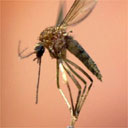
NHS Direct has seen a big rise in the number of people seeking advice about mosquito bites, it said today, following a combination of rain and rising temperatures that has helped the insects to thrive.
In the first 12 days of August, the advice service dealt with 1,491 telephone calls on mosquito bites, up by 28% on the 1,157 inquiries received in the same period in 2006.
Mosquitos were also the subject of 2,076 calls in July and an increasing number of searches on the NHS Direct website. From August 6 to 12, an article on insect bites received thousands of hits, making it the most popular out of more than 700 health encyclopaedia features.
Helen Young, the clinical director and director of nursing at NHS Direct, said: "Most insect bites result in small, local reactions where the symptoms can be easily treated.
"When an insect bites, it releases a form of saliva that can that give rise to inflammation, blisters and irritation. These can vary depending on the type of insect involved and the sensitivity of the person who is bitten."
Most bites result in small, itchy lumps that last for just a few days, but there can be more serious reactions.
Ms Young said: "If you have a severe allergic reaction to an insect bite, such as wheezing, or other signs of respiratory distress, or low blood pressure, you should call 999 immediately for medical assistance."
She recommended visiting the doctor "if your bites and the local reactions do not fade away within a few days or your bites get infected or if you have severe symptoms, such as swelling and blistering".
Minor cases can be eased by using a cold compress, such as a cold flannel or ice pack, or steroid creams, such as hydrocortisone or antihistamines.

